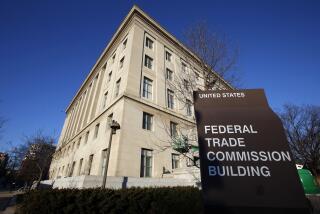FTC, States Target Deceptive E-Mail and Internet Fraud
In the third crackdown targeting online scams this year, the Federal Trade Commission announced Tuesday it had taken action against three Web sites accused of making fraudulent offers over the Internet.
The sites offered miracle cancer cures, a “can’t fail” chain letter scheme and compact discs that investigators said arrived late or not at all. Charges also were brought in a fourth case involving deceptive e-mail, but it was under seal in U.S. District Court and details were not released.
In addition to the four actions announced Tuesday, FTC officials said they were working with law enforcement agencies in six states and Canada to investigate chain letters, pump-and-dump stock schemes and other online scams. The director of the FTC’s Northwest region, Charles Harwood, said 650 warning letters were sent to people who had been involved in chain letters promising monetary rewards.
The court actions were taken against two Ohio residents--Linda Lightfoot and Charles Childs--who allegedly used Web sites and junk e-mail to promote a chain letter promising that a $41 investment would bring participants $10,000 within a few months. The FTC asked a federal court to force Lightfoot and Childs to send back to participants all funds collected.
CD distributor Sound City 2000 agreed to a settlement requiring it to refund customers who did not receive what they ordered.
The cancer cure site is registered to David L. Walker, who last year was charged with fraud by Washington state. The FTC asked a federal court to permanently shut down the site and force Walker to pay back customers.
Speaking at a Seattle news conference, math teacher Peter Fulton said he had bought Walker’s products in an attempt to treat his wife’s inoperable, pancreatic cancer. Fulton said he was normally a careful consumer but was desperate for a cure.
“It said there was hope,” Fulton said of the site. “When there is hope for life, how can I say no to my wife.”
Fulton said he spent about $1,500 on the treatments, which included “diet and strange solutions and an unusual machine that blinked and buzzed.” They had no effect and his wife died in 1999.
More to Read
Sign up for Essential California
The most important California stories and recommendations in your inbox every morning.
You may occasionally receive promotional content from the Los Angeles Times.











